2025年仁爱科普版英语中考一轮复习教案九年级上册 Unit 1 -Unit 2 (表格式)
文档属性
| 名称 | 2025年仁爱科普版英语中考一轮复习教案九年级上册 Unit 1 -Unit 2 (表格式) |
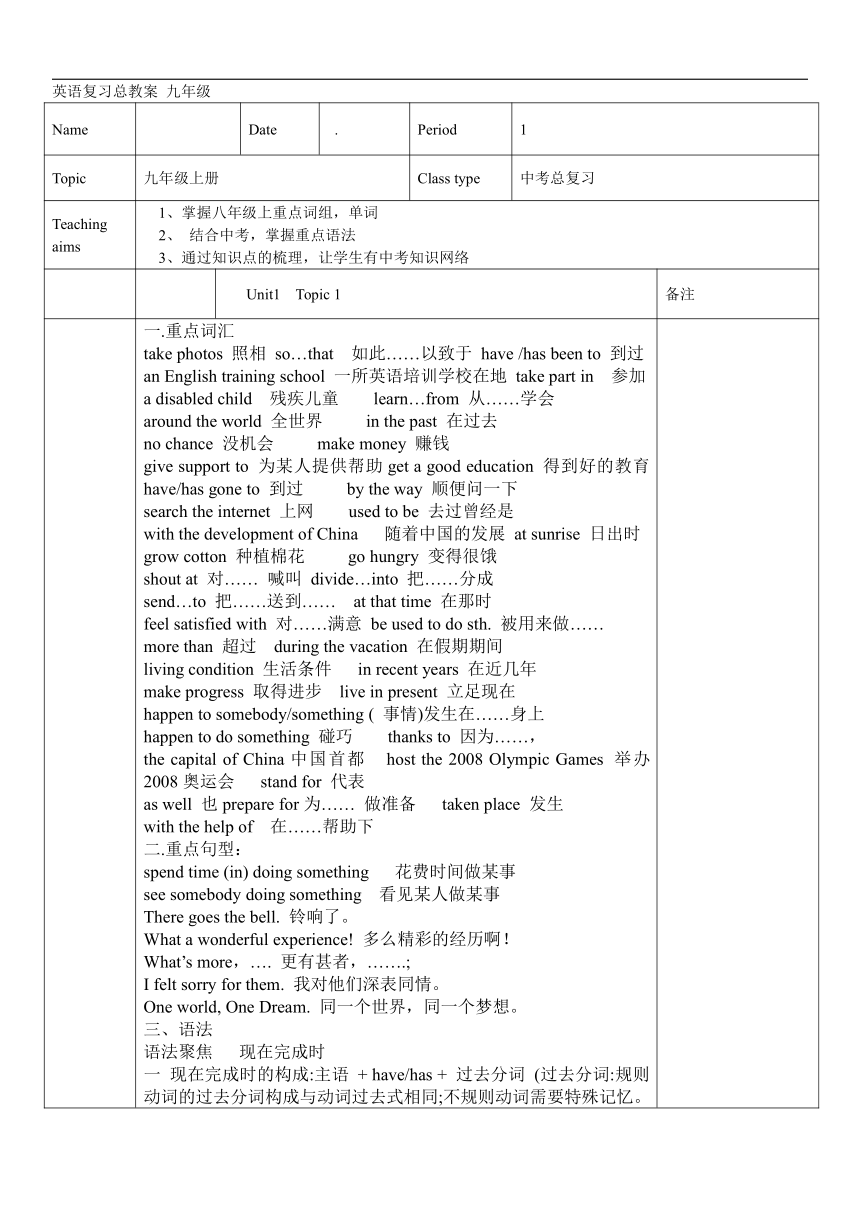
|
|
| 格式 | docx | ||
| 文件大小 | 41.7KB | ||
| 资源类型 | 教案 | ||
| 版本资源 | 仁爱科普版 | ||
| 科目 | 英语 | ||
| 更新时间 | 2025-07-29 08:14:52 | ||
图片预览

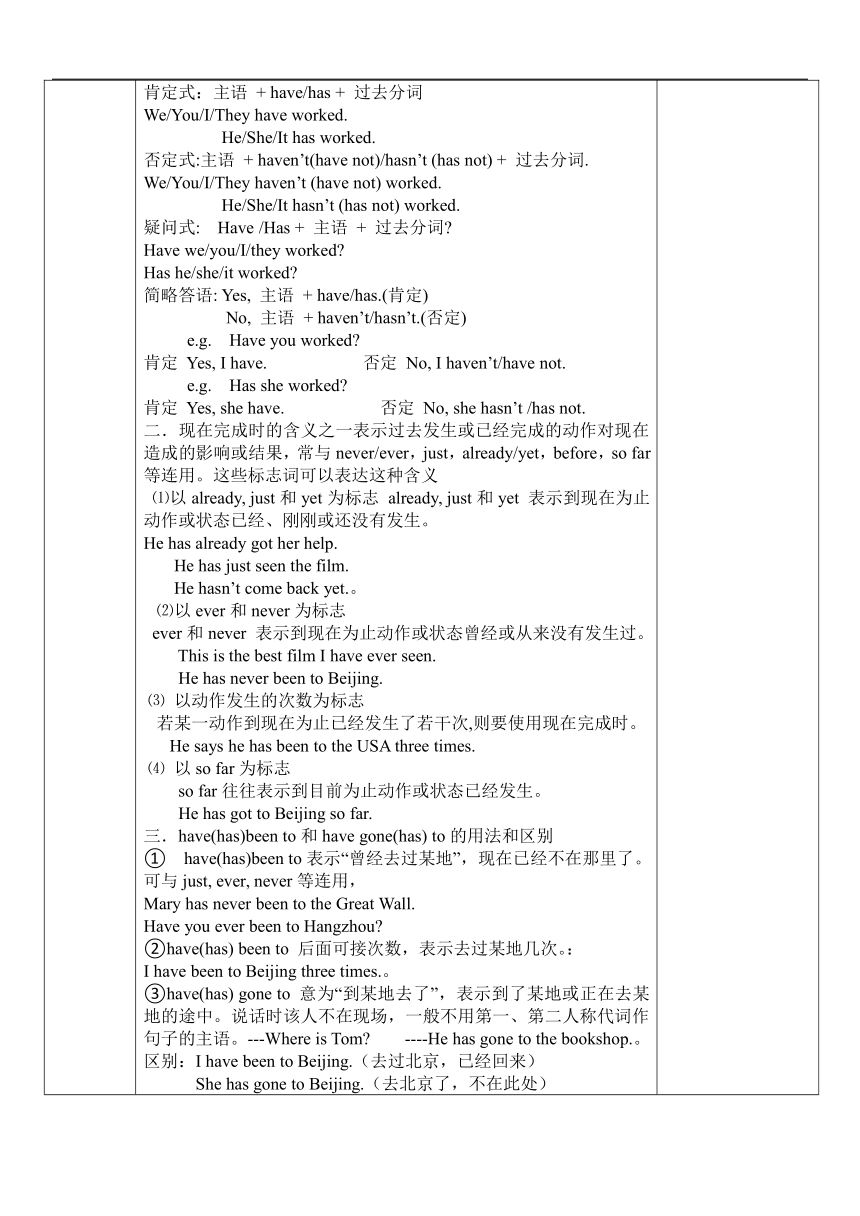
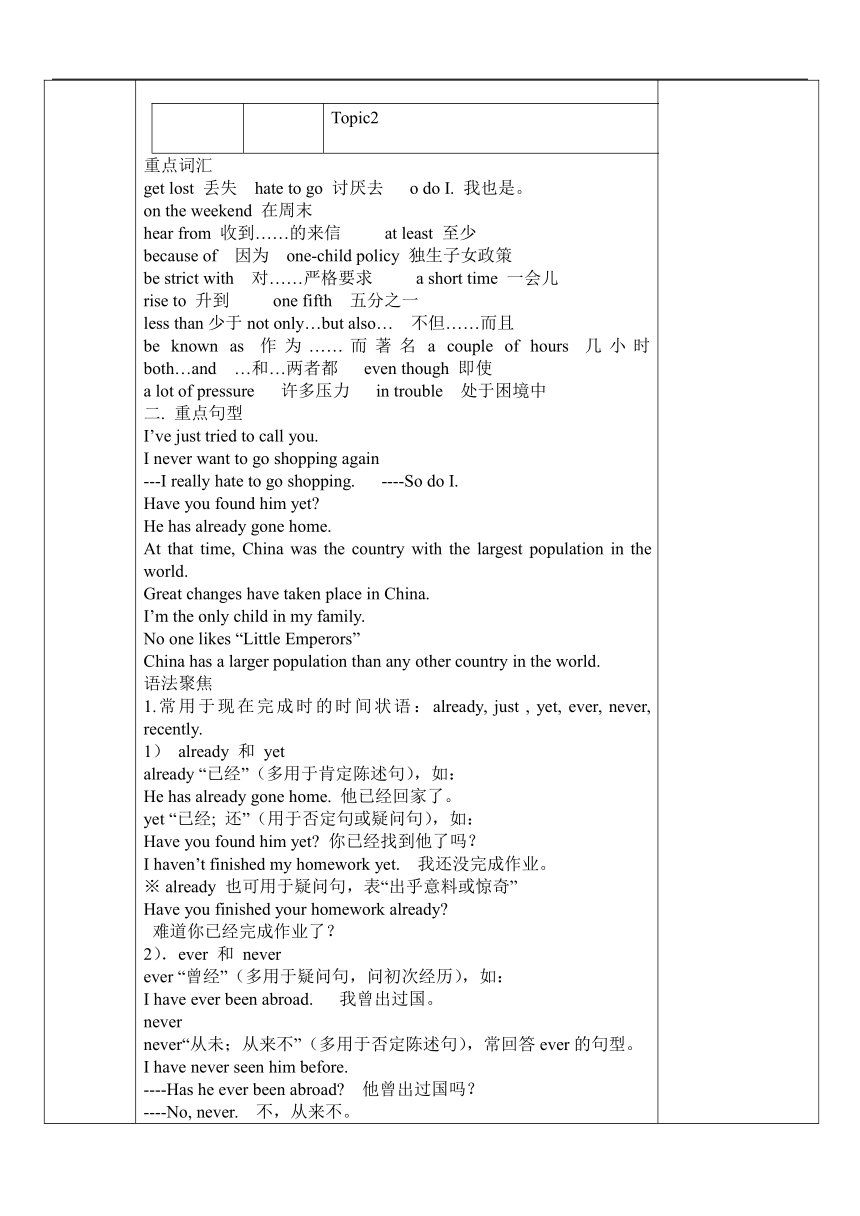
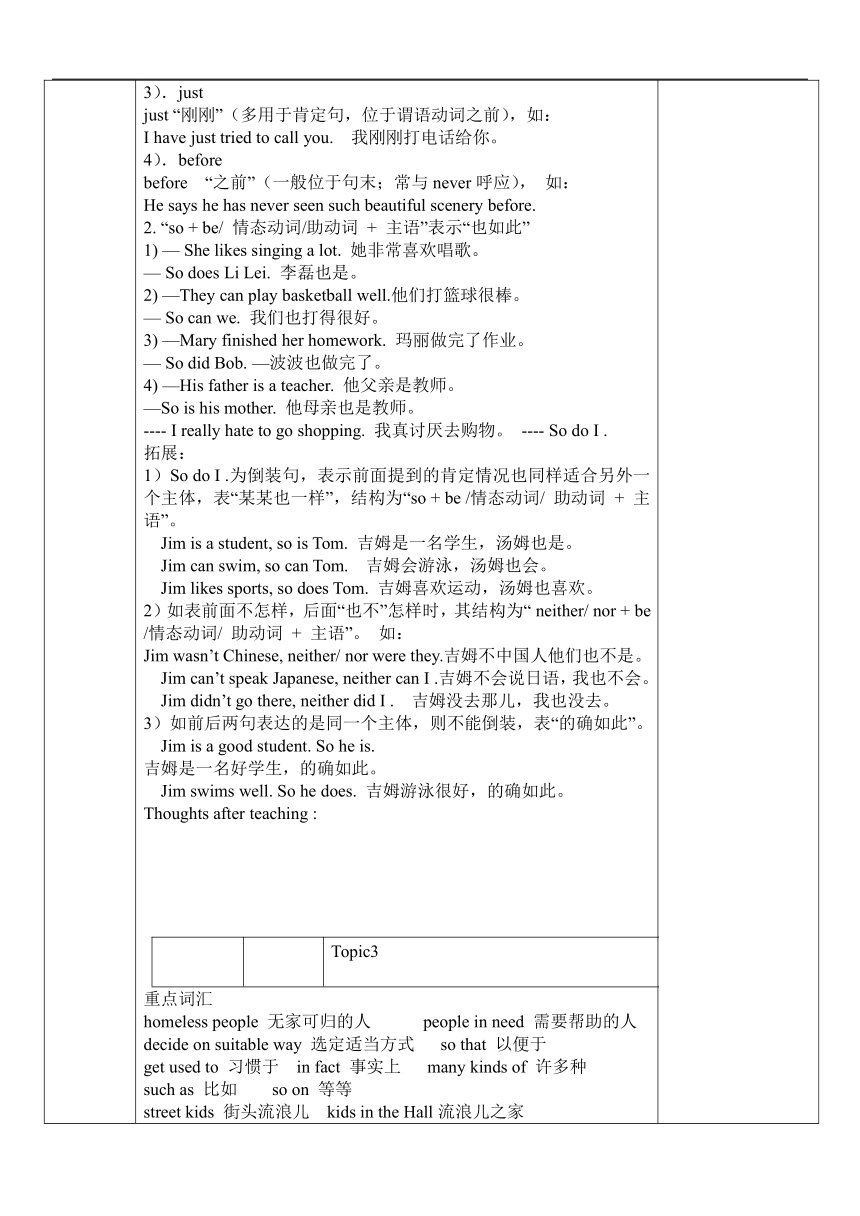
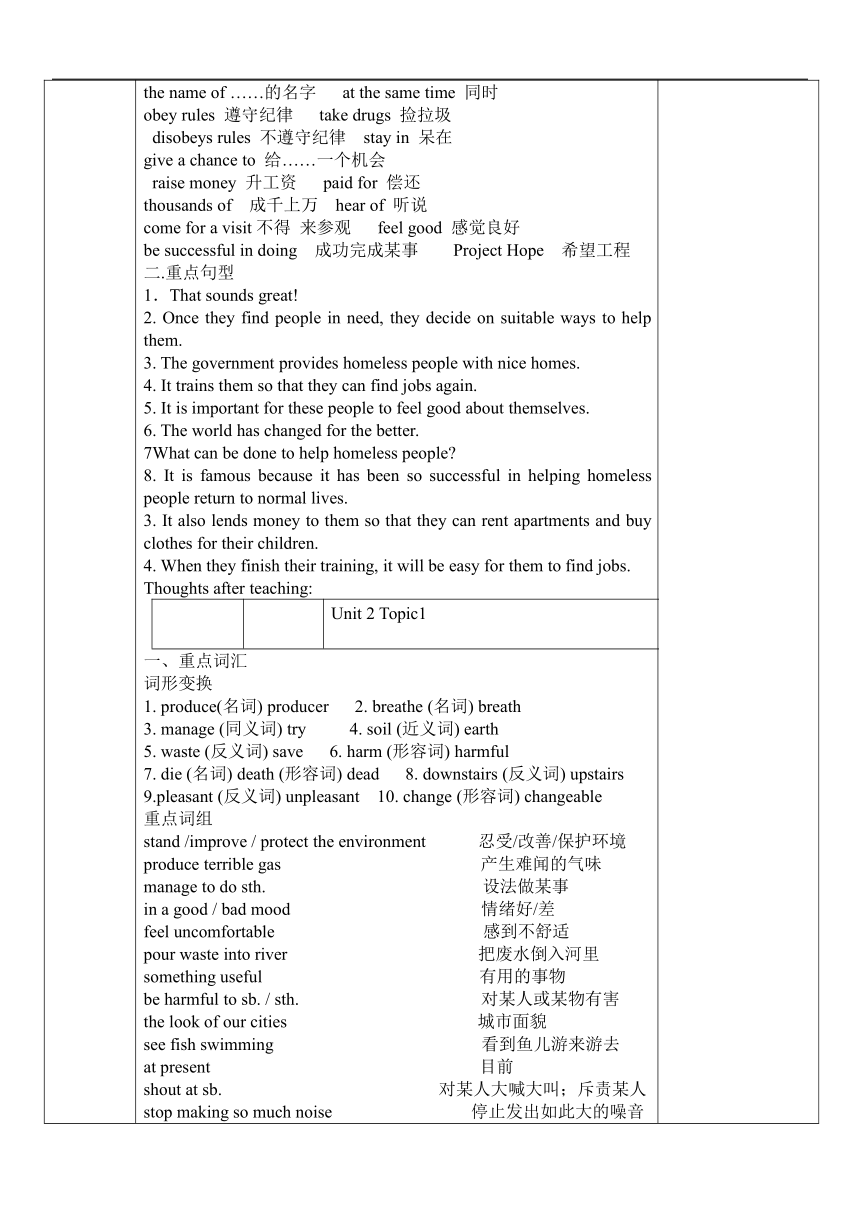
文档简介
英语复习总教案 九年级
Name Date . Period 1
Topic 九年级上册 Class type 中考总复习
Teaching aims 1、掌握八年级上重点词组,单词 2、 结合中考,掌握重点语法 3、通过知识点的梳理,让学生有中考知识网络
Unit1 Topic 1 备注
一.重点词汇 take photos 照相 so…that 如此……以致于 have /has been to 到过 an English training school 一所英语培训学校在地 take part in 参加 a disabled child 残疾儿童 learn…from 从……学会 around the world 全世界 in the past 在过去 no chance 没机会 make money 赚钱 give support to 为某人提供帮助get a good education 得到好的教育 have/has gone to 到过 by the way 顺便问一下 search the internet 上网 used to be 去过曾经是 with the development of China 随着中国的发展 at sunrise 日出时 grow cotton 种植棉花 go hungry 变得很饿 shout at 对…… 喊叫 divide…into 把……分成 send…to 把……送到…… at that time 在那时 feel satisfied with 对……满意 be used to do sth. 被用来做…… more than 超过 during the vacation 在假期期间 living condition 生活条件 in recent years 在近几年 make progress 取得进步 live in present 立足现在 happen to somebody/something ( 事情)发生在……身上 happen to do something 碰巧 thanks to 因为……, the capital of China中国首都 host the 2008 Olympic Games 举办2008奥运会 stand for 代表 as well 也prepare for为…… 做准备 taken place 发生 with the help of 在……帮助下 二.重点句型: spend time (in) doing something 花费时间做某事 see somebody doing something 看见某人做某事 There goes the bell. 铃响了。 What a wonderful experience! 多么精彩的经历啊! What’s more,…. 更有甚者,…….; I felt sorry for them. 我对他们深表同情。 One world, One Dream. 同一个世界,同一个梦想。 三、语法 语法聚焦 现在完成时 一 现在完成时的构成:主语 + have/has + 过去分词 (过去分词:规则动词的过去分词构成与动词过去式相同;不规则动词需要特殊记忆。 肯定式:主语 + have/has + 过去分词 We/You/I/They have worked. He/She/It has worked. 否定式:主语 + haven’t(have not)/hasn’t (has not) + 过去分词. We/You/I/They haven’t (have not) worked. He/She/It hasn’t (has not) worked. 疑问式: Have /Has + 主语 + 过去分词 Have we/you/I/they worked Has he/she/it worked 简略答语: Yes, 主语 + have/has.(肯定) No, 主语 + haven’t/hasn’t.(否定) e.g. Have you worked 肯定 Yes, I have. 否定 No, I haven’t/have not. e.g. Has she worked 肯定 Yes, she have. 否定 No, she hasn’t /has not. 二.现在完成时的含义之一表示过去发生或已经完成的动作对现在造成的影响或结果,常与never/ever,just,already/yet,before,so far等连用。这些标志词可以表达这种含义 ⑴以already, just和yet为标志 already, just和yet 表示到现在为止动作或状态已经、刚刚或还没有发生。 He has already got her help. He has just seen the film. He hasn’t come back yet.。 ⑵以ever和never为标志 ever和never 表示到现在为止动作或状态曾经或从来没有发生过。 This is the best film I have ever seen. He has never been to Beijing. ⑶ 以动作发生的次数为标志 若某一动作到现在为止已经发生了若干次,则要使用现在完成时。 He says he has been to the USA three times. ⑷ 以so far为标志 so far往往表示到目前为止动作或状态已经发生。 He has got to Beijing so far. 三.have(has)been to和have gone(has) to的用法和区别 ① have(has)been to表示“曾经去过某地”,现在已经不在那里了。可与just, ever, never等连用, Mary has never been to the Great Wall. Have you ever been to Hangzhou ②have(has) been to 后面可接次数,表示去过某地几次。: I have been to Beijing three times.。 ③have(has) gone to 意为“到某地去了”,表示到了某地或正在去某地的途中。说话时该人不在现场,一般不用第一、第二人称代词作句子的主语。---Where is Tom ----He has gone to the bookshop.。 区别:I have been to Beijing.(去过北京,已经回来) She has gone to Beijing.(去北京了,不在此处)
Topic2 备注
重点词汇 get lost 丢失 hate to go 讨厌去 o do I. 我也是。 on the weekend 在周末 hear from 收到……的来信 at least 至少 because of 因为 one-child policy 独生子女政策 be strict with 对……严格要求 a short time 一会儿 rise to 升到 one fifth 五分之一 less than少于not only…but also… 不但……而且 be known as 作为……而著名a couple of hours 几小时 both…and …和…两者都 even though 即使 a lot of pressure 许多压力 in trouble 处于困境中 二. 重点句型 I’ve just tried to call you. I never want to go shopping again ---I really hate to go shopping. ----So do I. Have you found him yet He has already gone home. At that time, China was the country with the largest population in the world. Great changes have taken place in China. I’m the only child in my family. No one likes “Little Emperors” China has a larger population than any other country in the world. 语法聚焦 1.常用于现在完成时的时间状语:already, just , yet, ever, never, recently. 1) already 和 yet already “已经”(多用于肯定陈述句),如: He has already gone home. 他已经回家了。 yet “已经; 还”(用于否定句或疑问句),如: Have you found him yet 你已经找到他了吗? I haven’t finished my homework yet. 我还没完成作业。 ※ already 也可用于疑问句,表“出乎意料或惊奇” Have you finished your homework already 难道你已经完成作业了? 2).ever 和 never ever “曾经”(多用于疑问句,问初次经历),如: I have ever been abroad. 我曾出过国。 never never“从未;从来不”(多用于否定陈述句),常回答ever的句型。 I have never seen him before. ----Has he ever been abroad 他曾出过国吗? ----No, never. 不,从来不。 3).just just “刚刚”(多用于肯定句,位于谓语动词之前),如: I have just tried to call you. 我刚刚打电话给你。 4).before before “之前”(一般位于句末;常与never呼应), 如: He says he has never seen such beautiful scenery before. 2. “so + be/ 情态动词/助动词 + 主语”表示“也如此” 1) — She likes singing a lot. 她非常喜欢唱歌。 — So does Li Lei. 李磊也是。 2) —They can play basketball well.他们打篮球很棒。 — So can we. 我们也打得很好。 3) —Mary finished her homework. 玛丽做完了作业。 — So did Bob. —波波也做完了。 4) —His father is a teacher. 他父亲是教师。 —So is his mother. 他母亲也是教师。 ---- I really hate to go shopping. 我真讨厌去购物。 ---- So do I . 拓展: 1)So do I .为倒装句,表示前面提到的肯定情况也同样适合另外一个主体,表“某某也一样”,结构为“so + be /情态动词/ 助动词 + 主语”。 Jim is a student, so is Tom. 吉姆是一名学生,汤姆也是。 Jim can swim, so can Tom. 吉姆会游泳,汤姆也会。 Jim likes sports, so does Tom. 吉姆喜欢运动,汤姆也喜欢。 2)如表前面不怎样,后面“也不”怎样时,其结构为“ neither/ nor + be /情态动词/ 助动词 + 主语”。 如: Jim wasn’t Chinese, neither/ nor were they.吉姆不中国人他们也不是。 Jim can’t speak Japanese, neither can I .吉姆不会说日语,我也不会。 Jim didn’t go there, neither did I . 吉姆没去那儿,我也没去。 3)如前后两句表达的是同一个主体,则不能倒装,表“的确如此”。 Jim is a good student. So he is. 吉姆是一名好学生,的确如此。 Jim swims well. So he does. 吉姆游泳很好,的确如此。 Thoughts after teaching : Topic3 备注
重点词汇 homeless people 无家可归的人 people in need 需要帮助的人 decide on suitable way 选定适当方式 so that 以便于 get used to 习惯于 in fact 事实上 many kinds of 许多种 such as 比如 so on 等等 street kids 街头流浪儿 kids in the Hall流浪儿之家 the name of ……的名字 at the same time 同时 obey rules 遵守纪律 take drugs 捡拉圾 disobeys rules 不遵守纪律 stay in 呆在 give a chance to 给……一个机会 raise money 升工资 paid for 偿还 thousands of 成千上万 hear of 听说 come for a visit不得 来参观 feel good 感觉良好 be successful in doing 成功完成某事 Project Hope 希望工程 二.重点句型 1.That sounds great! 2. Once they find people in need, they decide on suitable ways to help them. 3. The government provides homeless people with nice homes. 4. It trains them so that they can find jobs again. 5. It is important for these people to feel good about themselves. 6. The world has changed for the better. 7What can be done to help homeless people 8. It is famous because it has been so successful in helping homeless people return to normal lives. 3. It also lends money to them so that they can rent apartments and buy clothes for their children. 4. When they finish their training, it will be easy for them to find jobs. Thoughts after teaching: Unit 2 Topic1 备注
一、重点词汇 词形变换 1. produce(名词) producer 2. breathe (名词) breath 3. manage (同义词) try 4. soil (近义词) earth 5. waste (反义词) save 6. harm (形容词) harmful 7. die (名词) death (形容词) dead 8. downstairs (反义词) upstairs 9.pleasant (反义词) unpleasant 10. change (形容词) changeable 重点词组 stand /improve / protect the environment 忍受/改善/保护环境 produce terrible gas 产生难闻的气味 manage to do sth. 设法做某事 in a good / bad mood 情绪好/差 feel uncomfortable 感到不舒适 pour waste into river 把废水倒入河里 something useful 有用的事物 be harmful to sb. / sth. 对某人或某物有害 the look of our cities 城市面貌 see fish swimming 看到鱼儿游来游去 at present 目前 shout at sb. 对某人大喊大叫;斥责某人 stop making so much noise 停止发出如此大的噪音 disturb others 打扰别人 a kind of pollution 一种污染 be sorry for doing sth. 对做了某事感到抱歉 from now on 从现在起 in noisy conditions 在吵杂的条件下 become deaf 变聋了 quite a few 相当多 no better than (几乎)与……一样差 cause high blood pressure 引发高血压 in strong, changeable light 在强烈、易变的光线下 重点句型。 1. It is difficult for me to breathe. 对我来说很难呼吸。 2. ----How long have you been like this 你处于这样的状态多久了? I have been like this since last month. 自从上个月以来我一直这样。 3. It is a beautiful place with flowers and grass. 那是个有花、有草的美丽地方 4. All the flowers, grass and fish have gone! 所有的花、草和鱼儿都没有了! 5. It smells terrible. 难闻极了。 6. There are several chemical factories pouring waste water into the river. 7. It’s our duty to protect the environment. 保护环境是我们的职责。 8. I have been at this school since last year / for one year. 自从去年,我在这个学校了。 / 我来到这个学校有一年了。 9. Noise is a kind of pollution and it is harmful to our ears. 重点语法 现在完成时中延续性的动作或状态和由for / since 引导的一段时间状语搭配使用。 a)“for + 时间段” 与 “since + 时间点” 都表“一段时间”常用How long 提问。 如: ----How long have you been like this ----I have been like this since last month./ for a month. ----How long have you lived in Changle ----I have lived in Changle for ten years / since ten years ago. b) 如句中含有非延续性动词,则改为相应的延续性动词或状态。 I bought this TV three days ago.= I have had this TV for three days. 常见的非延续性动词转换成延续性动词如下: come—be here; go—be there; close—be closed; open—be open; buy—have; borrow —keep; leave—be away; begin—be on; finish—be over; die—be dead etc. Thoughts after teaching: Topic 2 备注
一、重点词汇 (一)词形变换 1. none (反义词) all 2. both (反义词) neither 3. rubbish (同义词) litter teal (过去式) stole (过去分词) stolen 5. spit (过去式;过去分词) spat 6. behave (名词) behavior 7. prevent (同义词) stop 8. although (同义词) though 9. pollute (句词) pollution pletely (形容词) complete (二)重点词组 1.read this article 看这篇文章 2.here and there = everywhere 到处 3.care for = look after = take care of 照顾 4.give some advice to /on… 提出一些建议给…… 5.set one’s mind to sth. 集中精力于……; 用心于…… 6.protect nature 保护自然 7.wash away 冲走 8.blow away 吹走;刮走 9.turn into = change into 转变成 10.die out 灭绝;绝迹 11.stop / prevent …(from) doing sth. 阻止……做某事 12.keep…from doing sth. 阻止……做某事 13.move toward… 朝……移动 14.cut down 砍倒 15.run away 跑走; 流走 16.cut off 中断 17.on the earth 在地球上 18. be in danger of (doing) sth. 处于做某事的危险中 19.destroy/ harm/ pollute the environment 破坏/损害/污染环境 20.have a quiet life 过着平静的生活 21.plenty of 大量的 22.come to realize 开始意识 23.have a clean-up 大扫除 24.one after another 一个接着另一个 25.on recycled paper 在再生纸上 26.enter the competition 进入比赛 27.offer one’s suggestion 提供某人的建议 二、重点句型 But the government has done something useful to protect the environment. 但政府为了保护环境已做了一些有益的事。 We shouldn’t leave rubbish here and there/ everywhere. 我们不应该到丢弃垃圾。 Don’t step on the grass or pick the flowers around us. Everyone should care for /look after/ take care of wild animals and plant more trees. 每一个人都应当保护野生动物并且多种树。 We should do everything we can to protect the environment. Nothing is difficult if you set your mind to it.世上无难事,只怕有心人。 The wind is blowing strongly with lots of sand. They are dying out because of all kinds of pollution. It caused Harbin City to cut off its water supply for five days.它导致哈尔滨市断水5 天。 Some things we’ve done are very good, while some are not good for the earth.我们所做的一些事情对地球有益,然而有一些却对地球有着负面影响。 11. As a result, many rivers and lakes are dead now. 重点语法 不定代词和不定副词: (一) 不定代词: 指人:someone/ somebody anyone/ anybody no one/ nobody everyone/everybody 指物:something anything nothing everything (二)不定副词 指地点:somewhere anywhere nowhere everywhere (三)用法: some-复合代词/副词常用于肯定句;如: I saw someone in the room. 我看见房间里有人。 There is something in the woods. 树林里有什么东西。 He has gone somewhere warm for his holiday. any-复合代词/副词常用于否定句或疑问句;如: I didn’t see anyone in the room. 我没看见有人在房间里。 There isn’t anything in the woods. 树林里没有什么东西。 He hasn’t gone somewhere warm for his holiday. no- 复合代词/副词表全否定;如: I saw nobody in the room. 我看见房间里没有人。 There is nothing in the woods. 树林里没有什么东西。 every- 复合代词/副词代替全部;如: Everyone is here. 大家都在这儿。 It seems he knows everything. 似乎他知道一切。 some-复合代词/副词用于疑问句中时,表希望得到对方的肯定回答或表请求; Would you like something to drink 你要点喝的东西吗? any-复合代词/副词用于肯定句时,表“任何”;如: If people spit anywhere in public, they should be punished. 不定代词作主语时,谓语动词用单数形式;如: No one knows this secret. 没有一人知道这个秘密。 Everything goes well. 一切进展顺利。 如果有定语修饰,定语应放在不定代词或不定副词后;如: I have something important to tell you. 我有重要的事告诉你。 There is nobody strange here. 这儿没有一个陌生人。 no= not any → nobody = not anybody; nothing = not anything She didn’t say anything. = She said nothing. 她什么也没说。 There is nobody strange here.= There isn’t anybody strange here. 这儿没有一个陌生人 Unit 2 Topic3 备注
一、重点词汇 (一)词形变换 1. organization(动词) organize 2.recycle(动名词) recycling 3. follow(形容词) following 4.electricity(形容词) electric 5. move(名词) movement 6. quick(副词) quickly 7. environment(形容词) environmental 8. protect(名词) protection (二)重点词组 environmental protection 环境的保护 work for… 为……工作 spread message about… 宣传有关…… reduce the waste/ air pollution 减少浪费/ 空气污染 both sides of … ……的两面 rather than (是)……而不是…. not only…but also… 不仅…….而且…… save money/ energy/ electricity 省钱/ 能源/ 电 be supposed to do sth. 应当做某事 travel a short distance 短途旅行 put…into… 把……放入…… take up a lot of space 占据许多空间 produce power from… 从……获得能量 run the car 发动汽车 push…forward /up /down 推…….向前/向上/向下 power machines 发动机器 produce electricity by doing sth. 通过做某事发电 the movement of water 水的流动 be used for doing sth 被用作做某事 take a quick shower 快速淋浴 make a short journey 短途旅行 pick the litter up 捡起垃圾 try harder 再努力 produce a short oral report 作一个简短的口头报告 二、重点句型 1.Let’s be greener people. 让我们做环保使者吧。 2.…my main job is to help spread message about protecting the environment. 我主要的工作是帮助做有关保护环境的宣传。 3.It’s kind of you to do that. 你那样做真是太好了。 4.Would you like to be a greener person 你想成为一名绿色使者吗? 5.Easier said than done. 说得容易,做得难。 6.Actions speak louder than words. 百说不如一干;事实胜于雄辩。 7.Of all the rubbish, about 35 percent can be recycled while the rest can’t.在所有的垃圾里,大约35%能被回收,但剩余的则不能。 8. They work well, but they are slow and can’t run for long. 重点语法 并列句:是由并列连词把两个或两个以上的简单句连在一起构成的句子,连词前可用逗号,也可不用逗号。 1.表示并列关系,常用连接词有and, not only…but also…等。如: His father is a teacher and his mother is a doctor. Mr. Green can not only drive a car but also repair it. 2.表示转折,常用连词有but, while等。如: I bought my sister a present, but she didn’t like it. 我给妹妹买了一件礼物,但是她并不喜欢。 Tom does housework every day while his sister does nothing. 汤姆每天都做家务活,而他的妹妹什么也不做。 3.表示选择关系,常用连词有or, either…or…等。如: He speaks French, or perhaps he understands it. 他会讲法语,或者懂法语。 Either he could not come or he did not want to. 他要么是不能来要么是不想来。 表示因果关系,常用连词有so, for等。如: Her mother is ill, so she has to stay at home and look after her mother. 她母亲病了,所以她不得不呆在家里照看她。 The ground is very wet, for it rained last night. 地面很湿,因为昨晚下雨了。 Thoughts after teaching:
Name Date . Period 1
Topic 九年级上册 Class type 中考总复习
Teaching aims 1、掌握八年级上重点词组,单词 2、 结合中考,掌握重点语法 3、通过知识点的梳理,让学生有中考知识网络
Unit1 Topic 1 备注
一.重点词汇 take photos 照相 so…that 如此……以致于 have /has been to 到过 an English training school 一所英语培训学校在地 take part in 参加 a disabled child 残疾儿童 learn…from 从……学会 around the world 全世界 in the past 在过去 no chance 没机会 make money 赚钱 give support to 为某人提供帮助get a good education 得到好的教育 have/has gone to 到过 by the way 顺便问一下 search the internet 上网 used to be 去过曾经是 with the development of China 随着中国的发展 at sunrise 日出时 grow cotton 种植棉花 go hungry 变得很饿 shout at 对…… 喊叫 divide…into 把……分成 send…to 把……送到…… at that time 在那时 feel satisfied with 对……满意 be used to do sth. 被用来做…… more than 超过 during the vacation 在假期期间 living condition 生活条件 in recent years 在近几年 make progress 取得进步 live in present 立足现在 happen to somebody/something ( 事情)发生在……身上 happen to do something 碰巧 thanks to 因为……, the capital of China中国首都 host the 2008 Olympic Games 举办2008奥运会 stand for 代表 as well 也prepare for为…… 做准备 taken place 发生 with the help of 在……帮助下 二.重点句型: spend time (in) doing something 花费时间做某事 see somebody doing something 看见某人做某事 There goes the bell. 铃响了。 What a wonderful experience! 多么精彩的经历啊! What’s more,…. 更有甚者,…….; I felt sorry for them. 我对他们深表同情。 One world, One Dream. 同一个世界,同一个梦想。 三、语法 语法聚焦 现在完成时 一 现在完成时的构成:主语 + have/has + 过去分词 (过去分词:规则动词的过去分词构成与动词过去式相同;不规则动词需要特殊记忆。 肯定式:主语 + have/has + 过去分词 We/You/I/They have worked. He/She/It has worked. 否定式:主语 + haven’t(have not)/hasn’t (has not) + 过去分词. We/You/I/They haven’t (have not) worked. He/She/It hasn’t (has not) worked. 疑问式: Have /Has + 主语 + 过去分词 Have we/you/I/they worked Has he/she/it worked 简略答语: Yes, 主语 + have/has.(肯定) No, 主语 + haven’t/hasn’t.(否定) e.g. Have you worked 肯定 Yes, I have. 否定 No, I haven’t/have not. e.g. Has she worked 肯定 Yes, she have. 否定 No, she hasn’t /has not. 二.现在完成时的含义之一表示过去发生或已经完成的动作对现在造成的影响或结果,常与never/ever,just,already/yet,before,so far等连用。这些标志词可以表达这种含义 ⑴以already, just和yet为标志 already, just和yet 表示到现在为止动作或状态已经、刚刚或还没有发生。 He has already got her help. He has just seen the film. He hasn’t come back yet.。 ⑵以ever和never为标志 ever和never 表示到现在为止动作或状态曾经或从来没有发生过。 This is the best film I have ever seen. He has never been to Beijing. ⑶ 以动作发生的次数为标志 若某一动作到现在为止已经发生了若干次,则要使用现在完成时。 He says he has been to the USA three times. ⑷ 以so far为标志 so far往往表示到目前为止动作或状态已经发生。 He has got to Beijing so far. 三.have(has)been to和have gone(has) to的用法和区别 ① have(has)been to表示“曾经去过某地”,现在已经不在那里了。可与just, ever, never等连用, Mary has never been to the Great Wall. Have you ever been to Hangzhou ②have(has) been to 后面可接次数,表示去过某地几次。: I have been to Beijing three times.。 ③have(has) gone to 意为“到某地去了”,表示到了某地或正在去某地的途中。说话时该人不在现场,一般不用第一、第二人称代词作句子的主语。---Where is Tom ----He has gone to the bookshop.。 区别:I have been to Beijing.(去过北京,已经回来) She has gone to Beijing.(去北京了,不在此处)
Topic2 备注
重点词汇 get lost 丢失 hate to go 讨厌去 o do I. 我也是。 on the weekend 在周末 hear from 收到……的来信 at least 至少 because of 因为 one-child policy 独生子女政策 be strict with 对……严格要求 a short time 一会儿 rise to 升到 one fifth 五分之一 less than少于not only…but also… 不但……而且 be known as 作为……而著名a couple of hours 几小时 both…and …和…两者都 even though 即使 a lot of pressure 许多压力 in trouble 处于困境中 二. 重点句型 I’ve just tried to call you. I never want to go shopping again ---I really hate to go shopping. ----So do I. Have you found him yet He has already gone home. At that time, China was the country with the largest population in the world. Great changes have taken place in China. I’m the only child in my family. No one likes “Little Emperors” China has a larger population than any other country in the world. 语法聚焦 1.常用于现在完成时的时间状语:already, just , yet, ever, never, recently. 1) already 和 yet already “已经”(多用于肯定陈述句),如: He has already gone home. 他已经回家了。 yet “已经; 还”(用于否定句或疑问句),如: Have you found him yet 你已经找到他了吗? I haven’t finished my homework yet. 我还没完成作业。 ※ already 也可用于疑问句,表“出乎意料或惊奇” Have you finished your homework already 难道你已经完成作业了? 2).ever 和 never ever “曾经”(多用于疑问句,问初次经历),如: I have ever been abroad. 我曾出过国。 never never“从未;从来不”(多用于否定陈述句),常回答ever的句型。 I have never seen him before. ----Has he ever been abroad 他曾出过国吗? ----No, never. 不,从来不。 3).just just “刚刚”(多用于肯定句,位于谓语动词之前),如: I have just tried to call you. 我刚刚打电话给你。 4).before before “之前”(一般位于句末;常与never呼应), 如: He says he has never seen such beautiful scenery before. 2. “so + be/ 情态动词/助动词 + 主语”表示“也如此” 1) — She likes singing a lot. 她非常喜欢唱歌。 — So does Li Lei. 李磊也是。 2) —They can play basketball well.他们打篮球很棒。 — So can we. 我们也打得很好。 3) —Mary finished her homework. 玛丽做完了作业。 — So did Bob. —波波也做完了。 4) —His father is a teacher. 他父亲是教师。 —So is his mother. 他母亲也是教师。 ---- I really hate to go shopping. 我真讨厌去购物。 ---- So do I . 拓展: 1)So do I .为倒装句,表示前面提到的肯定情况也同样适合另外一个主体,表“某某也一样”,结构为“so + be /情态动词/ 助动词 + 主语”。 Jim is a student, so is Tom. 吉姆是一名学生,汤姆也是。 Jim can swim, so can Tom. 吉姆会游泳,汤姆也会。 Jim likes sports, so does Tom. 吉姆喜欢运动,汤姆也喜欢。 2)如表前面不怎样,后面“也不”怎样时,其结构为“ neither/ nor + be /情态动词/ 助动词 + 主语”。 如: Jim wasn’t Chinese, neither/ nor were they.吉姆不中国人他们也不是。 Jim can’t speak Japanese, neither can I .吉姆不会说日语,我也不会。 Jim didn’t go there, neither did I . 吉姆没去那儿,我也没去。 3)如前后两句表达的是同一个主体,则不能倒装,表“的确如此”。 Jim is a good student. So he is. 吉姆是一名好学生,的确如此。 Jim swims well. So he does. 吉姆游泳很好,的确如此。 Thoughts after teaching : Topic3 备注
重点词汇 homeless people 无家可归的人 people in need 需要帮助的人 decide on suitable way 选定适当方式 so that 以便于 get used to 习惯于 in fact 事实上 many kinds of 许多种 such as 比如 so on 等等 street kids 街头流浪儿 kids in the Hall流浪儿之家 the name of ……的名字 at the same time 同时 obey rules 遵守纪律 take drugs 捡拉圾 disobeys rules 不遵守纪律 stay in 呆在 give a chance to 给……一个机会 raise money 升工资 paid for 偿还 thousands of 成千上万 hear of 听说 come for a visit不得 来参观 feel good 感觉良好 be successful in doing 成功完成某事 Project Hope 希望工程 二.重点句型 1.That sounds great! 2. Once they find people in need, they decide on suitable ways to help them. 3. The government provides homeless people with nice homes. 4. It trains them so that they can find jobs again. 5. It is important for these people to feel good about themselves. 6. The world has changed for the better. 7What can be done to help homeless people 8. It is famous because it has been so successful in helping homeless people return to normal lives. 3. It also lends money to them so that they can rent apartments and buy clothes for their children. 4. When they finish their training, it will be easy for them to find jobs. Thoughts after teaching: Unit 2 Topic1 备注
一、重点词汇 词形变换 1. produce(名词) producer 2. breathe (名词) breath 3. manage (同义词) try 4. soil (近义词) earth 5. waste (反义词) save 6. harm (形容词) harmful 7. die (名词) death (形容词) dead 8. downstairs (反义词) upstairs 9.pleasant (反义词) unpleasant 10. change (形容词) changeable 重点词组 stand /improve / protect the environment 忍受/改善/保护环境 produce terrible gas 产生难闻的气味 manage to do sth. 设法做某事 in a good / bad mood 情绪好/差 feel uncomfortable 感到不舒适 pour waste into river 把废水倒入河里 something useful 有用的事物 be harmful to sb. / sth. 对某人或某物有害 the look of our cities 城市面貌 see fish swimming 看到鱼儿游来游去 at present 目前 shout at sb. 对某人大喊大叫;斥责某人 stop making so much noise 停止发出如此大的噪音 disturb others 打扰别人 a kind of pollution 一种污染 be sorry for doing sth. 对做了某事感到抱歉 from now on 从现在起 in noisy conditions 在吵杂的条件下 become deaf 变聋了 quite a few 相当多 no better than (几乎)与……一样差 cause high blood pressure 引发高血压 in strong, changeable light 在强烈、易变的光线下 重点句型。 1. It is difficult for me to breathe. 对我来说很难呼吸。 2. ----How long have you been like this 你处于这样的状态多久了? I have been like this since last month. 自从上个月以来我一直这样。 3. It is a beautiful place with flowers and grass. 那是个有花、有草的美丽地方 4. All the flowers, grass and fish have gone! 所有的花、草和鱼儿都没有了! 5. It smells terrible. 难闻极了。 6. There are several chemical factories pouring waste water into the river. 7. It’s our duty to protect the environment. 保护环境是我们的职责。 8. I have been at this school since last year / for one year. 自从去年,我在这个学校了。 / 我来到这个学校有一年了。 9. Noise is a kind of pollution and it is harmful to our ears. 重点语法 现在完成时中延续性的动作或状态和由for / since 引导的一段时间状语搭配使用。 a)“for + 时间段” 与 “since + 时间点” 都表“一段时间”常用How long 提问。 如: ----How long have you been like this ----I have been like this since last month./ for a month. ----How long have you lived in Changle ----I have lived in Changle for ten years / since ten years ago. b) 如句中含有非延续性动词,则改为相应的延续性动词或状态。 I bought this TV three days ago.= I have had this TV for three days. 常见的非延续性动词转换成延续性动词如下: come—be here; go—be there; close—be closed; open—be open; buy—have; borrow —keep; leave—be away; begin—be on; finish—be over; die—be dead etc. Thoughts after teaching: Topic 2 备注
一、重点词汇 (一)词形变换 1. none (反义词) all 2. both (反义词) neither 3. rubbish (同义词) litter teal (过去式) stole (过去分词) stolen 5. spit (过去式;过去分词) spat 6. behave (名词) behavior 7. prevent (同义词) stop 8. although (同义词) though 9. pollute (句词) pollution pletely (形容词) complete (二)重点词组 1.read this article 看这篇文章 2.here and there = everywhere 到处 3.care for = look after = take care of 照顾 4.give some advice to /on… 提出一些建议给…… 5.set one’s mind to sth. 集中精力于……; 用心于…… 6.protect nature 保护自然 7.wash away 冲走 8.blow away 吹走;刮走 9.turn into = change into 转变成 10.die out 灭绝;绝迹 11.stop / prevent …(from) doing sth. 阻止……做某事 12.keep…from doing sth. 阻止……做某事 13.move toward… 朝……移动 14.cut down 砍倒 15.run away 跑走; 流走 16.cut off 中断 17.on the earth 在地球上 18. be in danger of (doing) sth. 处于做某事的危险中 19.destroy/ harm/ pollute the environment 破坏/损害/污染环境 20.have a quiet life 过着平静的生活 21.plenty of 大量的 22.come to realize 开始意识 23.have a clean-up 大扫除 24.one after another 一个接着另一个 25.on recycled paper 在再生纸上 26.enter the competition 进入比赛 27.offer one’s suggestion 提供某人的建议 二、重点句型 But the government has done something useful to protect the environment. 但政府为了保护环境已做了一些有益的事。 We shouldn’t leave rubbish here and there/ everywhere. 我们不应该到丢弃垃圾。 Don’t step on the grass or pick the flowers around us. Everyone should care for /look after/ take care of wild animals and plant more trees. 每一个人都应当保护野生动物并且多种树。 We should do everything we can to protect the environment. Nothing is difficult if you set your mind to it.世上无难事,只怕有心人。 The wind is blowing strongly with lots of sand. They are dying out because of all kinds of pollution. It caused Harbin City to cut off its water supply for five days.它导致哈尔滨市断水5 天。 Some things we’ve done are very good, while some are not good for the earth.我们所做的一些事情对地球有益,然而有一些却对地球有着负面影响。 11. As a result, many rivers and lakes are dead now. 重点语法 不定代词和不定副词: (一) 不定代词: 指人:someone/ somebody anyone/ anybody no one/ nobody everyone/everybody 指物:something anything nothing everything (二)不定副词 指地点:somewhere anywhere nowhere everywhere (三)用法: some-复合代词/副词常用于肯定句;如: I saw someone in the room. 我看见房间里有人。 There is something in the woods. 树林里有什么东西。 He has gone somewhere warm for his holiday. any-复合代词/副词常用于否定句或疑问句;如: I didn’t see anyone in the room. 我没看见有人在房间里。 There isn’t anything in the woods. 树林里没有什么东西。 He hasn’t gone somewhere warm for his holiday. no- 复合代词/副词表全否定;如: I saw nobody in the room. 我看见房间里没有人。 There is nothing in the woods. 树林里没有什么东西。 every- 复合代词/副词代替全部;如: Everyone is here. 大家都在这儿。 It seems he knows everything. 似乎他知道一切。 some-复合代词/副词用于疑问句中时,表希望得到对方的肯定回答或表请求; Would you like something to drink 你要点喝的东西吗? any-复合代词/副词用于肯定句时,表“任何”;如: If people spit anywhere in public, they should be punished. 不定代词作主语时,谓语动词用单数形式;如: No one knows this secret. 没有一人知道这个秘密。 Everything goes well. 一切进展顺利。 如果有定语修饰,定语应放在不定代词或不定副词后;如: I have something important to tell you. 我有重要的事告诉你。 There is nobody strange here. 这儿没有一个陌生人。 no= not any → nobody = not anybody; nothing = not anything She didn’t say anything. = She said nothing. 她什么也没说。 There is nobody strange here.= There isn’t anybody strange here. 这儿没有一个陌生人 Unit 2 Topic3 备注
一、重点词汇 (一)词形变换 1. organization(动词) organize 2.recycle(动名词) recycling 3. follow(形容词) following 4.electricity(形容词) electric 5. move(名词) movement 6. quick(副词) quickly 7. environment(形容词) environmental 8. protect(名词) protection (二)重点词组 environmental protection 环境的保护 work for… 为……工作 spread message about… 宣传有关…… reduce the waste/ air pollution 减少浪费/ 空气污染 both sides of … ……的两面 rather than (是)……而不是…. not only…but also… 不仅…….而且…… save money/ energy/ electricity 省钱/ 能源/ 电 be supposed to do sth. 应当做某事 travel a short distance 短途旅行 put…into… 把……放入…… take up a lot of space 占据许多空间 produce power from… 从……获得能量 run the car 发动汽车 push…forward /up /down 推…….向前/向上/向下 power machines 发动机器 produce electricity by doing sth. 通过做某事发电 the movement of water 水的流动 be used for doing sth 被用作做某事 take a quick shower 快速淋浴 make a short journey 短途旅行 pick the litter up 捡起垃圾 try harder 再努力 produce a short oral report 作一个简短的口头报告 二、重点句型 1.Let’s be greener people. 让我们做环保使者吧。 2.…my main job is to help spread message about protecting the environment. 我主要的工作是帮助做有关保护环境的宣传。 3.It’s kind of you to do that. 你那样做真是太好了。 4.Would you like to be a greener person 你想成为一名绿色使者吗? 5.Easier said than done. 说得容易,做得难。 6.Actions speak louder than words. 百说不如一干;事实胜于雄辩。 7.Of all the rubbish, about 35 percent can be recycled while the rest can’t.在所有的垃圾里,大约35%能被回收,但剩余的则不能。 8. They work well, but they are slow and can’t run for long. 重点语法 并列句:是由并列连词把两个或两个以上的简单句连在一起构成的句子,连词前可用逗号,也可不用逗号。 1.表示并列关系,常用连接词有and, not only…but also…等。如: His father is a teacher and his mother is a doctor. Mr. Green can not only drive a car but also repair it. 2.表示转折,常用连词有but, while等。如: I bought my sister a present, but she didn’t like it. 我给妹妹买了一件礼物,但是她并不喜欢。 Tom does housework every day while his sister does nothing. 汤姆每天都做家务活,而他的妹妹什么也不做。 3.表示选择关系,常用连词有or, either…or…等。如: He speaks French, or perhaps he understands it. 他会讲法语,或者懂法语。 Either he could not come or he did not want to. 他要么是不能来要么是不想来。 表示因果关系,常用连词有so, for等。如: Her mother is ill, so she has to stay at home and look after her mother. 她母亲病了,所以她不得不呆在家里照看她。 The ground is very wet, for it rained last night. 地面很湿,因为昨晚下雨了。 Thoughts after teaching:
